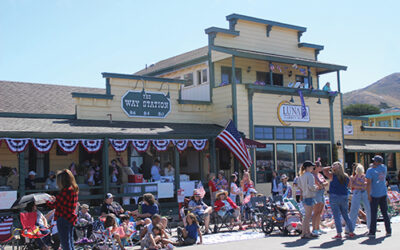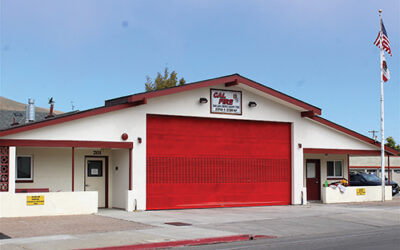Another sign that the coronavirus pandemic is slowing down was recently approved by the Morro Bay City Council, which voted to increase City business license fees and its Master Fee Schedule across the board.
Interim Finance Director and City Treasurer, Katie Lichtig, proposed increasing the business license fees by the current rate of inflation, which is supposed to be looked at every year, but in the midst of the pandemic response’s business closures, was skipped last year.
“There is a natural increase in revenue from Business Taxes,” Lichtig’s report said, “that is assumed as the result of annual Consumer Price Index [inflation] increase, as provided by the municipal code as approved by the voters in 1988 [Measure A]. That increase has been included in the proposed FY 2021/22 budget submittal for Council consideration.”
But don’t call the business licenses “fees,” according to the City. It used to be that the business licenses were automatically increased every year for inflation and would not even be discussed by Council.
But in 2011/12 they were rolled into the City’s “Master Fee Schedule,” which sets the annual charges for things like planning and building impact fees, rental of public facilities and recreation classes, and is reviewed in a public process every year.
Then in 2014, Lichtig said, the City Attorney recommended the “Business Tax Rate Schedule” be separated from the Master Fee Schedule, “since the business tax assessments are not fees,” Lichtig said. “That correction was made in November 2014.”
The City bases its inflation calculations on the change in CPI for the Los Angeles-Riverside-Orange Counties region from March 2020 to March 2021, which Lichtig said came to 2.2%.
It’s the first time the Council raised the cost of doing business in town in two years, as they skipped an increase for the current fiscal year “due to the severe, unprecedented, and unpredictable impacts of the COVID-19 pandemic on the local business community, thereby foregoing General Fund revenues that were replaced by the General Fund Emergency Reserves,” the report said. The new rates take effect July 1.
So how much are business licenses going up? Cost for a “basic business license for all undesignated professions” is going from $151.34 to $154.67. It’s the same increase for most of the various business categories’ basic charges.
For motels, hotels, multiple dwellings, rest homes, rooming houses, sanitariums and hospitals with more than four rooms the fees are going from $151.34 plus $6.01 per room, to $154.67 plus $6.14 per room.
For art, hobby or handicraft shows and exhibitions, farmers markets and special events, the fees are going from $151.34 to $154.67. For vendors the costs go from $9.39 per day to $9.60 per day and from $15.43 to $15.77 for a weekend. Or vendors that set up regularly can pay $52.64 a year, up from $51.51.
If you own vending machines around town, the City charges 1% of your gross income for each machine and you’ll have to show receipts, too.
Moneylenders and pawn shops will go from $607.18 to $620.54 but for public utilities the fee is going from just $151.34 to $154.67.
Want to put on a dinner dance? The City wants $64.92 per day up from $63.52, unless admission is free, then there’s no charge. Same charges apply for wrestling and boxing bouts, as well as for Merry-Go-Rounds, Revolving Wheel Chutes, toboggans, slides, mechanical riding contrivances (mechanical bulls) or pony rides.
And if you’re an “itinerant merchant” (pop-up store), the fees are now $66.16 per day, $130.07 a week, $192.77 a month, $253.02 per quarter (3 months), and for 180 days, it’s a whopping $316.93, making it far cheaper to simply pay for a regular, annual business license at $154.
The City also approved a new “Master Fee Schedule” with the inflation rate (2.0%) or the Engineering News-Record (3.16%), which ever is called for as per the type of service being provided.
“Fee activities are services and functions provided by the City to individuals who receive some direct material benefit above and beyond services offered to residents at general taxpayer expense. Council has directed this annual process be revised to have one consolidated fee schedule brought forward in late Spring,” Lichtig’s report said.
These fees are supposed to only cover the City’s expenses to provide the services, and can’t be a “moneymaker” beyond that. But fee increases, traditionally lag behind cost increases — especially for employees — and so every few years they do a new study that determines the costs to provide a service and calculates the fees based on recovering all or most of the costs.
The last such study the City did found many fees were short. But the proposed huge increases on some fees were not well received by the public and so the Council chose to “phase-in” the increases over a couple of years.
The second of the phases for specific fees was supposed to kick in last January but were delayed until the start of the new fiscal year in response to the pandemic.
“Staff recommended, and the Council adopted a deferral of these phase-in’s to help support and provide some relief to City customers due to the impacts of the COVID-19 pandemic. The Council also adopted deferred increases to the live aboard and commercial slip and pier fees [those fees went into effect on October 1, 2020],” Lichtig said.
All of the fees are being increased by either the CPI-inflation rate of 2.0% or the ENR rate of 3.16%, whichever applies to the type of fee involved.
Among the new fees are those involving the two cannabis dispensaries that are now opened in town, and a doubling — from $5 a day to $10 a day — of the parking fees for boat trailers at the public launch ramp.
And in keeping with past practices, the commercial fishing industry is getting a special discount in exchange for a big payoff to the harbor department to help with its future maintenance costs.
The commercial fishing boat slips owned and operated by the Harbor Department — at the two T-piers, the Beach, and Dunes Street docks and the launch ramp docks — were raised to $7.10 per foot (boat length) per month and then to $8.16 in 2021. (This includes a city policy of a 15% discount in fees paid by commercial fishers).
But after speaking with the Morro Bay Commercial Fishermen’s Organization, which lobbied against the full $8.16/ft., rate claiming it would hurt the local industry, the increase was delayed to October 2022 and will only be $8 a foot.
In exchange, the MBCFO, according to the staff report, would apply for a $100,000 grant from the “Central California Joint Cable Fisheries Liaison Committee,” and give it to the harbor department, “once a construction project on the docks and piers moves forward.”
That $100,000 is far more than the City is losing from the discount and 1-year delay in implementing the fee hikes, according to Lichtig.
The Liaison Committee is a group of trawl fishermen that signed an agreement with undersea cable companies to compensate the fishermen for the loss of fishing grounds due to the cables’ routes. The Liaison Committee provides grants to fishing groups to support the industry and the fishermen agree not to drag nets over the undersea cables.
Lichtig said the MBCFO would obtain the grant monies to “reduce impact on the local industry, while also providing financial support for physical improvements to the City slips and piers they utilize,” Lichtig said.
But not all fees cover the costs, despite the City Council having this as a major city goal. For example, the amount for a “Refundable appeal fee for non-land use administrative decisions” is proposed to jump to $306 each from $300. But a footnote in the schedule notes that it costs the City $3,565 to process an administrative permit appeal (made to the planning commission). That is just an 8.6% cost recovery rate but it is doubtful the residents would tolerate a $3,600 fee for filing an appeal of a decision made by planning staff.
Development impact fees are all going up a little. For example the fee for residential single-family development is now $4.63 per square foot; residential multi-family is $7.43/s.f.; accessory dwelling units (granny units) are $1.12/s.f.; commercial development is $4.70 s.f.; commercial office is $3.32 s.f.; and industrial is $1.70 s.f.
The permit cost to remove a tree on private property is now $581.50. And the fine for violating any planning and building codes is now twice the cost of the permit that you didn’t get first, plus $51 a day for every day after the City red-tags the job.
And the economic windfall expected form the two cannabis dispensaries now open for business in town is: $9,000 for a commercial cannabis operating permit; plus $4,500 annual renewals. The police department charges $470 to conduct background checks on every employee, which is a big jump from the initial $165 fee.
From there, the police department wants $235 per year for each employee to be checked again. They also charge $580 to do a background check on dispensary owners.
This is on top of the $475,000 a year the City hopes to get from the 5% sales tax the Council put on the cannabis products they sell.
And if your burglar alarm keeps going off the police department won’t charge anything the first two times it happens in a calendar year. But will charge you $388 for the third false alarm and for every false alarm after that, making it potentially very expensive for a boy who who cries wolf.


